For more tips on recognising and prreventing bird damage, click here.
|
Of course slugs are always a prioblem, but if the leaves look torn then the culprit is almost certainly sparrows. Since the dry spring of 2012 they have developed a real taste for these seedlings. Netting need to be very thorough; they are clever, agile little chaps and will go through gaps to get what they want. Isn't nature wonderful (if at times very irritating)?
For more tips on recognising and prreventing bird damage, click here.
0 Comments
Last year we fed our leeks with a liquid manure for high nitrates. Despite spacing them well apart and picking off affected leaves, the damage from rust was extreme.
Leek rust is always worst in wet years, and noth last summer and this saw the heavy rain which spreads the spores. Consulting an 'expert' at a Northern leek show, we were told to spray with dilute washing up liquid. However, I did notice that this expert's leeks were also badly affected by rust, so it couldn't be that effective! After reading everything I could lay my hands on, we went for the following experimental policy:
Result? The best leeks we've had in years and very much less rust! 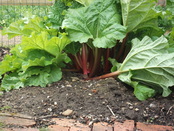 Old country lore says that putting a short piece of cut rhubarb stem, or torn up rhubarb leaves, in the planting hole when planting brassicas will prevent clubroot. Another version says boil the leaves in water and pour the water in the holes. "Does it work?" We're asked . . . The idea is, apparently, that the calcium oxalate found in the leaves kills the fungus. However, when tested at the University of Edinburgh in 2008, it was found that the use of rhubarb had no significant effect. What little effect it did have was due to the calcium, which increased the soil pH slightly. The usual way of keeping clubroot at bay (apart from being very careful when buying plants) is to practice good crop rotation and lime the soil well before planting. The lime (calcium carbonate in the case of powdered chalk) has a much more powerful effect in controlling clubroot, but crop rotation is also very important. Rhubarb has no noticeable effect. For more about crop rotation click here Leek rust is always worse after a wet winter. Or a wet summer the year before. So it's no surprise that this year it's a nightmare. Unfortunately there is no chemical (not even fancy organic stuff) available to control leek rust. After hours researching on line, all we could find was articles from commercial growers the world over wailing about how the professional fungicides they were using (so much stronger than the ones amateur gardeners can buy) were no use at all. As commercial garlic crops are affected by the same fungus, I have no doubt that the big multinational agrochemical companies are frantically working to find a cure, in the sure and certain knowledge that they will make billions from growers. So we can hope to see something in due course, but that's no consolation now. You can reduce the leek rust problem by some cultural techniques: the plants will still get it, but will struggle along and still produce a decent enough crop.
What can I do? Weeds, especially grass, do a lot of damage to your crops. Fruit bushes are greedy plants and the grass steals the food and water they so badly need. Remove the weeds, feed the plants, and you'll really notice a difference in your yields.
Couch grass getting in amongst fruit bushes is a very common problem on Ashford allotments and there is still time to clear them of weeds if you use the 'cheat's method' described on our 'Advice & Information' page. Click here to discover the secret. I've rather let things go this summer and parts of my plot are very overgrown, especially amongst the fruit bushes. Can I use glyphosate weedkiller now, or do I have to wait till the spring? I'd like to get it sorted.
The directions on the packet recommend using glyphosate weedkillers when weeds are in active growth. Certainly you'll get the best results using it in March or April - but that will be too late to clear weeds from under your fruit bushes. You can use glyphosate in winter as long as you remember its limitations. See this blog which may be helpful. I never used to get any problems with downy mildew on my onions. But for the past few years, just as they are beginning to bulk up nicely, the tips of the leaves start to go pale brown and when I look I can see the nasty grey spores developing. Is there anything I can do?
Downy mildew is definitely more of a problem than it used to be, and last year with it's damp conditions, followed by this year's cold late spring, have made matters worse. The spores are airborne so rotating the crop (which you should be doing anyway) won't help much. F1 variety Santero, from Suttons, is allegedly mildew resistant. Other things you can do are space the crop well, so the leaves don't touch, and watch any chives or welsh onion on your plot like a hawk - they may be harbouring the disease and infecting your onions. 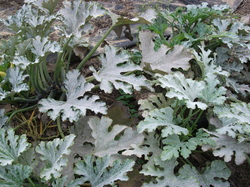 Pretty as the effect is, John doesn't think his squash should have looked like this by September. The culprit is mildew, usually worse if plants are dry at the root. This particular kind of mildew will reduce yields (because the leaves aren't working so efficiently) but doesn't kill the plant. If it appears early in the season, it is worth tackling - by September the plants are past their sell-by date anyway, so don't worry. If you don't want to use a fungicide (and personally I never like to spray anything I'm just about to eat!) then try this tip. Make up a solution of ordinary Bicarbonate of soda - how strong doesn't matter much - and spray the leaves regularly as a foliar feed. It helps control it. Planting over a trench of rotting compost helps avoid the roots getting dry - click here to go to our page with tips on on trench composting Click here to go to an article on the "Gardening Know-How" website on using bicarbonate of soda to control mildew. 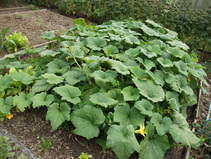 Click on the pic to go to seed supplier Click on the pic to go to seed supplier Some types of squash are more resistant than others. This is "Tromba", a summer squash very like courgette in flavour, growing not far from the silvery plants above. By September, when all other squash plants had at least a touch of mildew, "Tromba" was still totally disease-free. 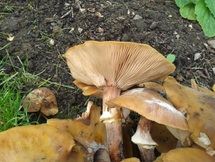 "Is this honey fungus?" asks Anne. No, after double-double-checking, it isn't. John agrees. Admittedly it looks very like . . . click here to go to the rhs page on honey fungus. 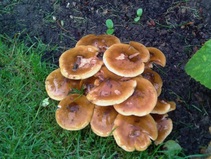 Honey fungus is rare on allotments, because it can't survive on dug-over ground. However, it may invade a fruit patch from a nearby hedge, or appear if you leave old roots in the ground. Always clear the soil thoroughly before planting fruit bushes, and regularly dig over any soil between them and neighbouring hedges. If you get honey fungus in a garden, there are ways of treating it, but they are expensive, and if your fruit section is affected it would be better to dig out the bushes, clean the soil thoroughly to a couple of spade spits down, and start again. If you can move your fruit to a different area, do so. |
Send in your problem to us
Use the CONTACT US form - or email your query, with a photo if at all possible, to ashfordallotments Archives
June 2015
Categories
All
|
 RSS Feed
RSS Feed
